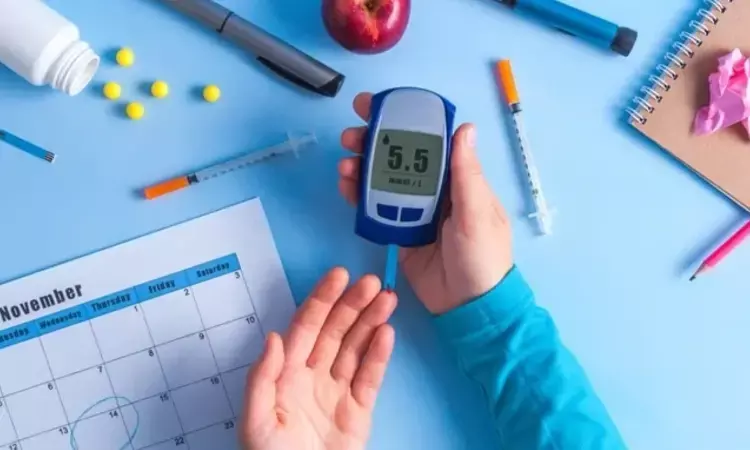- Home
- Medical news & Guidelines
- Anesthesiology
- Cardiology and CTVS
- Critical Care
- Dentistry
- Dermatology
- Diabetes and Endocrinology
- ENT
- Gastroenterology
- Medicine
- Nephrology
- Neurology
- Obstretics-Gynaecology
- Oncology
- Ophthalmology
- Orthopaedics
- Pediatrics-Neonatology
- Psychiatry
- Pulmonology
- Radiology
- Surgery
- Urology
- Laboratory Medicine
- Diet
- Nursing
- Paramedical
- Physiotherapy
- Health news
- Fact Check
- Bone Health Fact Check
- Brain Health Fact Check
- Cancer Related Fact Check
- Child Care Fact Check
- Dental and oral health fact check
- Diabetes and metabolic health fact check
- Diet and Nutrition Fact Check
- Eye and ENT Care Fact Check
- Fitness fact check
- Gut health fact check
- Heart health fact check
- Kidney health fact check
- Medical education fact check
- Men's health fact check
- Respiratory fact check
- Skin and hair care fact check
- Vaccine and Immunization fact check
- Women's health fact check
- AYUSH
- State News
- Andaman and Nicobar Islands
- Andhra Pradesh
- Arunachal Pradesh
- Assam
- Bihar
- Chandigarh
- Chattisgarh
- Dadra and Nagar Haveli
- Daman and Diu
- Delhi
- Goa
- Gujarat
- Haryana
- Himachal Pradesh
- Jammu & Kashmir
- Jharkhand
- Karnataka
- Kerala
- Ladakh
- Lakshadweep
- Madhya Pradesh
- Maharashtra
- Manipur
- Meghalaya
- Mizoram
- Nagaland
- Odisha
- Puducherry
- Punjab
- Rajasthan
- Sikkim
- Tamil Nadu
- Telangana
- Tripura
- Uttar Pradesh
- Uttrakhand
- West Bengal
- Medical Education
- Industry
Liver Protein Protects against Stiff Arteries in Obesity and Diabetes

New research identifies the importance of the protein adropin in preventing stiffness in the arteries of people with obesity and type 2 diabetes. The study is published ahead of print in the American Journal of Physiology-Heart and Circulatory Physiology.
Arterial stiffness is a condition associated with aging and insulin resistance, a chronic condition associated with obesity, and is a major contributor in the development of cardiovascular disease, including heart attack and stroke.
Adropin, a protein produced by the liver and other tissues, is involved in maintaining energy balance in the body and the metabolism of fat and sugar. Previous studies have suggested that adropin also plays a role in regulating cardiovascular health. People with chronic conditions such as obesity and type 2 diabetes have been found to have lower levels of adropin in the bloodstream.
Researchers reported decreased expression of adropin in the liver was associated with both an elevated body mass index and hemoglobin A1c, a marker of glycemic control, in patients undergoing bariatric surgery. In a separate group, people with type 2 diabetes had lower adropin levels and increased arterial stiffness when compared to healthy controls.
In addition, the researchers studied arteries isolated from mice that were lacking adropin. They reported that "loss of adropin alone causes an increase in arterial stiffness, mimicking the effects of obesity and type 2 diabetes." The researchers later used adropin to treat arterial stiffening in a mouse model of obesity and type 2 diabetes and found that "adropin exposure reduces obesity and type 2 diabetes-associated arterial stiffening."
These findings suggest that people with low adropin levels are more likely to develop arterial stiffening and, therefore, greater consideration should be given to adropin as a potential therapeutic target in the prevention and treatment of cardiovascular disease in people with obesity and type 2 diabetes.
Reference:
Role of adropin in arterial stiffening associated with obesity and type 2 diabetes. Thomas J. Jurrissen, Francisco I. Ramirez-Perez, Francisco J. Cabral-Amador, Rogerio N. Soares, Ryan J. Pettit-Mee, Edgar E. Betancourt-Cortes, Neil J. McMillan, Neekun Sharma, Helena N. M. Rocha, Shumpei Fujie, Mariana Morales-Quinones, Yoskaly Lazo-Fernandez, Andrew A. Butler, Subhashis Banerjee, Harold S. Sacks, Jamal A. Ibdah, Elizabeth J. Parks, R. Scott Rector, Camila Manrique-Acevedo, Luis A. Martinez-Lemus, and Jaume Padilla, 09 SEP 2022 https://doi.org/10.1152/ajpheart.00385.2022
Dr Kamal Kant Kohli-MBBS, DTCD- a chest specialist with more than 30 years of practice and a flair for writing clinical articles, Dr Kamal Kant Kohli joined Medical Dialogues as a Chief Editor of Medical News. Besides writing articles, as an editor, he proofreads and verifies all the medical content published on Medical Dialogues including those coming from journals, studies,medical conferences,guidelines etc. Email: drkohli@medicaldialogues.in. Contact no. 011-43720751


